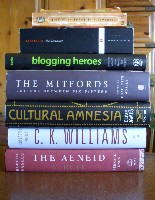Morning Read
 ¶ In the Decameron (IV, ii): “He who is wicked and held to be good, can cheat because no one imagines he would.” This reads like a mash-up of two stories, the first a tale of one very silly woman, Mona Lisetta ( given many mocking nicknames — Lady Numbskull, Lady Birdbrain, &c), who believes that she’s so sexy that the Archangel Gabriel lusts after her, and the more slapstick account of comeuppance, in which the Archangel’s impersonator is tarred and feathered, only with honey instead of tar. Throughout, however, the tale is yet another attack on the hypocrisy of the religious orders.
¶ In the Decameron (IV, ii): “He who is wicked and held to be good, can cheat because no one imagines he would.” This reads like a mash-up of two stories, the first a tale of one very silly woman, Mona Lisetta ( given many mocking nicknames — Lady Numbskull, Lady Birdbrain, &c), who believes that she’s so sexy that the Archangel Gabriel lusts after her, and the more slapstick account of comeuppance, in which the Archangel’s impersonator is tarred and feathered, only with honey instead of tar. Throughout, however, the tale is yet another attack on the hypocrisy of the religious orders.
¶ The end of the fifth book of the Aeneid, at last! The strange death of Palinurus — time to re-read Cyril Connolly?
¶ C. K. Williams: the end of “A Dream of Mind,” — again, at last. These poems seem to take place in the absence of gravity; I never know which way is up. Nor, for that matter of that, do I really know what the poet is talking about. This book (also called A Dream of Mind) concludes with a final long poem, “Helen.” I shall try to read it in one sitting, and then close this collection and move on to someone else.
¶ Clive James on Beatrix Potter. “Her stories attract tweeness toward them — the Peter Rabbit Ballet must be hard to take for anyone except a very tiny child — but are never winsome in themselves, mainly because of her tactile, yet quite tough, feeling for language.” Even better:
Written in a age when it was still assumed the children would not suffer brain damage from hearing a phrase they couldn’t immediately understand, the books are plentifully supplied with elevated verbal constructions. The bright child sees unfamiliar phrases going by just overhead and reaches up, while the parent is reminded of the historic privilege of being born into a civilization where the morality of children’s books, even at their worthily—meant worst, has evolved through supply and demand, and not been imposed by the state according to a plan.”
¶ Today’s Blogging Hero: Mark Frauenfelder, of BoingBoing.net. Something to take up later today, when writing for tomorrow about blogs:
Q: What tips or advice would you like to hear with bloggers?
A: I think it’s really important to write a good headline. It’s better to be accurate than it is to be cute or clever. When you make a post, do a little summary of what it is in the headline, because a lot of people read blogs through RSS and go to the headline first to see what’s going on. It can make a difference in whether you get read.
As for the blog post itself, if you’re writing about something out on the Web, give a good short description of why it’s interesting. When I see something I want to talk about, I outline some of the questions that readers might ask, like “Why is this interesting?” or, “Why is this important?” I write down the answers, and then I post.
¶ Diana to Deborah, in September 1980, on the subject of Evelyn Waugh’s correspondence: “Isn’t it amazing who the person one’s writing to influences one.” Indeed.
Not so much fun:
But what happened with Jebb’s silly film shows the depth of seething hatred Decca feels for us. It is much more painful to hate than to be hated, & I am aware that her life is in many ways rather awful, but not quite awful enough to excuse her behaviour. As far as I go, I put her out of my mind.”
